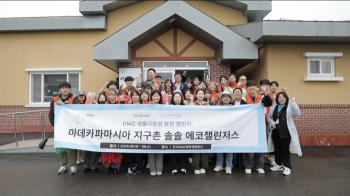Effective herbal medicine treatment for side effects of esophagitis caused by radiation therapy
Sep 22, 2025
|
The Spinal Joint Research Institute (Director Ha In-hyuk) of Jaseng Oriental Hospital announced on the 22nd that it published a research paper in the SCI(E)-level international academic journal 'Integrative Cancer Therapies (IF=3.077)'.
Radiation esophagitis is a common complication in patients who have undergone radiation therapy during the course of treating cancers that occur in the chest (lung cancer, esophageal cancer, breast cancer, mediastinal cancer, etc.). During radiation therapy for chest cancer, the patient's esophagus is inevitably exposed to a certain amount of radiation, and at this time, the inner wall of the esophagus is stimulated and inflammation and swelling occur on the surface of the mucous membrane, causing radiation esophagitis.
Major symptoms of radiation esophagitis include odynophagia, which causes tingling and burning pain in the esophagus whenever food is swallowed, as well as indigestion, esophageal stenosis, anorexia, nausea, and chest pain. In serious cases, patients may suffer from dehydration or malnutrition due to lack of water in the body because they rarely consume food. As a result, secondary problems such as decreased immunity and general weakness are also accompanied, which may eventually lead to death.
In response, Ha Jae-joon, a research team at the Spinal Joint Research Institute of Jaseng Oriental Medicine Hospital, analyzed the prevention and treatment effects through systematic literature review by dividing the herbal medicine treatment group who took herbal medicine and the control group who only received universal Western treatment based on clinical research data from 7,283 patients with radiation esophagitis.
In the clinical study, oral herbal medicine mainly taken by patients in the herbal medicine group was prepared with a mixture of herbal medicine such as saengjihwang, mungdong, hyeongsam, gold, and licorice. Control patients used pain and mucosal protection symptomatic treatment to relieve symptoms.
As a result of the analysis, it was confirmed that the herbal medicine treatment group had a higher prevention rate of radiation esophagitis by about 29% than the control group. This means that it can effectively alleviate esophageal damage that is common during radiation therapy. In particular, considering the situation in which there was no clear prevention and treatment for radiation esophagitis, it suggests that herbal medicine treatment may be a clinical alternative.
In addition, in the recovery rate analysis that evaluated treatment effectiveness, the herbal medicine treatment group recorded about 29% higher than the control group. This goes beyond just symptom suppression and shows that it can also contribute to accelerating the recovery rate of patients with already expressed radiation esophagitis. In fact, herbal medicine has been reported to help mucosal regeneration and control inflammatory responses, so the consistency of the pharmacological mechanisms revealed in this study and the basic study increases treatment reliability. In addition, no significant adverse reactions were reported in the herbal medicine treatment group, showing positive results in terms of safety.
Doctor Ha Jae-joon of Oriental Medicine said, "If patients who had undergone radiation therapy due to cancer in their chests took herbal medicine, significant results were found, such as reducing the incidence of radiation esophagitis or alleviating symptoms."If larger clinical studies are conducted in the future, it will be a solid basis for proving the effectiveness of herbal medicine treatment."
|
This article was translated by Naver AI translator.















